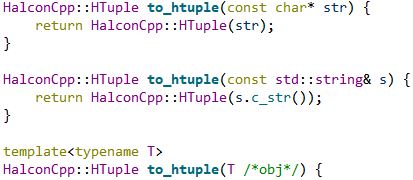Conversion of standard C++ data structures to HalconCpp::HTuple
2020-04-01 by Andreas Heindl

Conversion to HTuple
When working with the HALCON/CPP interface one often needs to convert C++ data structures to HalconCpp::HTuple. We present here some example code that can be used for this task.
Please note: We have tested this code and it seems to work but we take no responsibility for its correctness. Suggestions for its improvement are always welcome.
HalconCpp::HTuple to_htuple(const char* str) {
return HalconCpp::HTuple(str);
}
HalconCpp::HTuple to_htuple(const std::string& s) {
return HalconCpp::HTuple(s.c_str());
}
template<typename T>
HalconCpp::HTuple to_htuple(T /*obj*/) {
static_assert(!std::is_same_v<T,T>, "not implemented");
}
template<typename T>
HalconCpp::HTuple to_htuple(std::vector<T> obj) {
return HalconCpp::HTuple(obj.data(),static_cast<Hlong>(obj.size()));
}
HalconCpp::HTuple to_htuple(const std::vector<const char*>& obj) {
if (obj.empty()) {
return {};
}
const auto s = static_cast<Hlong>(obj.size());
HalconCpp::HTuple t;
t[s-1] = "";
for (Hlong i = 0; i < s; ++i) {
t[i] = obj.at(static_cast<size_t>(i));
}
return t;
}
HalconCpp::HTuple to_htuple(const std::vector<std::string>& obj) {
const auto s = static_cast<Hlong>(obj.size());
HalconCpp::HTuple t(HalconCpp::HTuple(s),HalconCpp::HTuple(""));
for (Hlong i = 0; i < s; ++i) {
t[i] = obj.at(static_cast<size_t>(i)).data();
}
return t;
}
HalconCpp::HTuple to_htuple(std::vector<bool> obj) {
HalconCpp::HTuple t;
for (const bool b: obj) {
t.Append(b ? 1 : 0);
}
return t;
}